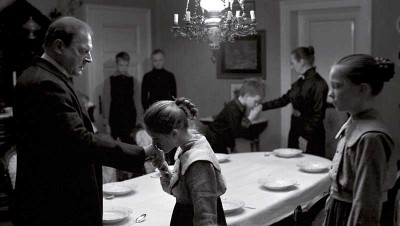
Michael Haneke's The White Ribbon (Das Weisse Band) is an intensely creepy portrait of a sick society - a rural village whose rotten core presages Germany's darkest hour. In the months immediately before the outbreak of World War I, a village at the center of a relatively prosperous baronial fiefdom grapples with felonious pranks, hidden incest, and deadly accidents, all of which baffle the community's leaders. As these minor disasters accrue, all signs slowly point in a direction that the village elders are unwilling to confront. By the film's end, there is a distinct suggestion that the village is a microcosmic representation of the rise of an evil generation in Germany, a generation born out of a misplaced trust in the outmoded mores of a decrepit social structure. Parents who believe in tenant farming, puritanical religious practice, and corporal punishment raise a crop of quietly vicious children who seem to be conspirators in an unknown plot to destroy the town, or worse.
The way that Haneke paces The White Ribbon, the way that characters are introduced "in action," with hardly a hint of expository dialogue, and his patient, sturdy camerawork suggest a director who has taken all of the lessons of Alfred Hitchcock and improved upon them. This is most noticeably achieved through a great confidence in actors; Haneke allows his amazing cast to shape characters that are remarkably diverse in their personalities. The slowness of The White Ribbon is counterbalanced by its unusual tension - the sense that something horrendous is afoot. Yet this is not once borne out through shock tactics, grotesque visuals, or acts of violence. Little of the horror that lurks beneath the film's surface is conveyed in simple visual terms. The insidious creeping evil is instead "discovered" as characters experience moments of seemingly minor revelation, or happen upon an incident that might otherwise be of little consequence. The aggregation of these things, however, amounts to a bone-chilling chain of evidence that threatens to rot the village from the inside out.
High-contrast black-and-white photography by Christian Berger helps portray this early twentieth century village as a place that is, in a way, outside of time. The location is fictional, and the visual style allows the story to play out in a way not overly beholden to a specific setting. The film is captured in long, static shots. There are few cuts, and composition is a far more prominent feature of the visual style than in most films.
The cast is uniformly excellent. As the schoolteacher, Christian Friedel lends a youthful, earnest energy as one of the few people in the village whose intentions appear genuinely honorable. Rainer Bock plays the doctor, whose riding accident sets the story in motion; he is one of the most memorably despicable characters in recent cinema. Also outstanding is Burghart Klaußner as the village pastor, a fearsomely committed zealot who forces one of his sons to admit to masturbation and punishes him by having his hands tied to his bed frame while he sleeps.
The White Ribbon succeeds as an anthropological investigation and an unorthodox mystery. There is also room for subtle political allegory amid the frightening mood. However one might wish to categorize it, it's a film that operates at the highest levels of cinematic storytelling and technical mastery.

No comments:
Post a Comment